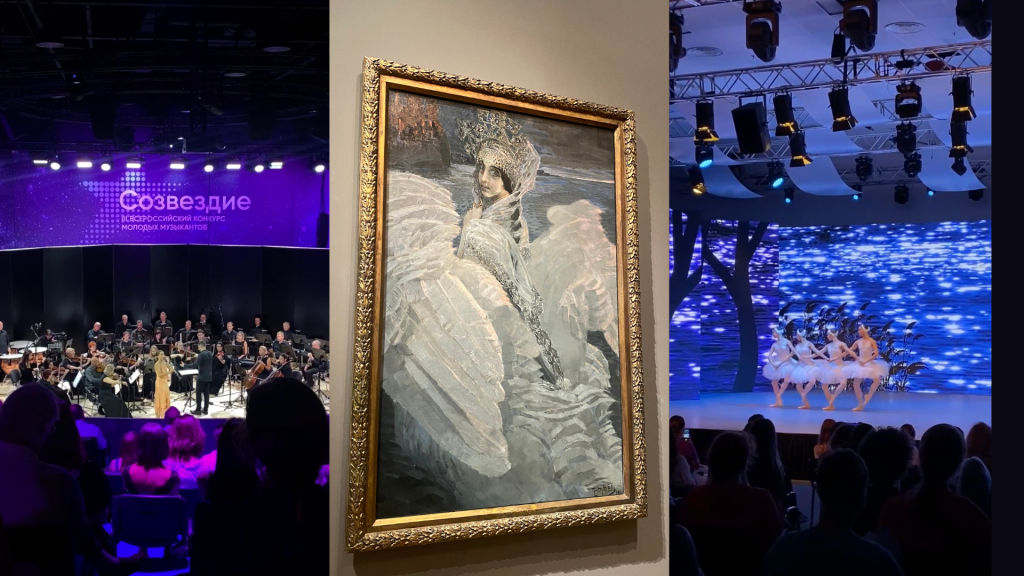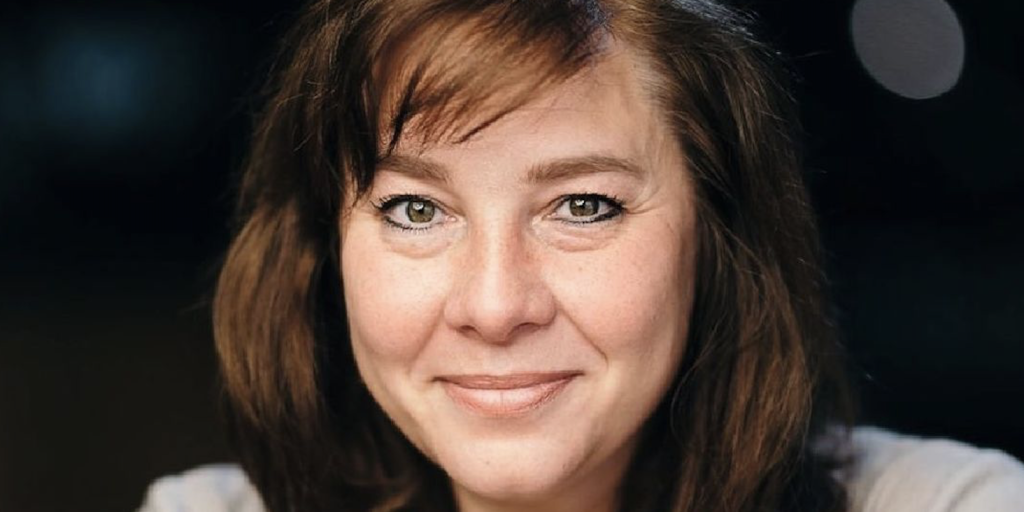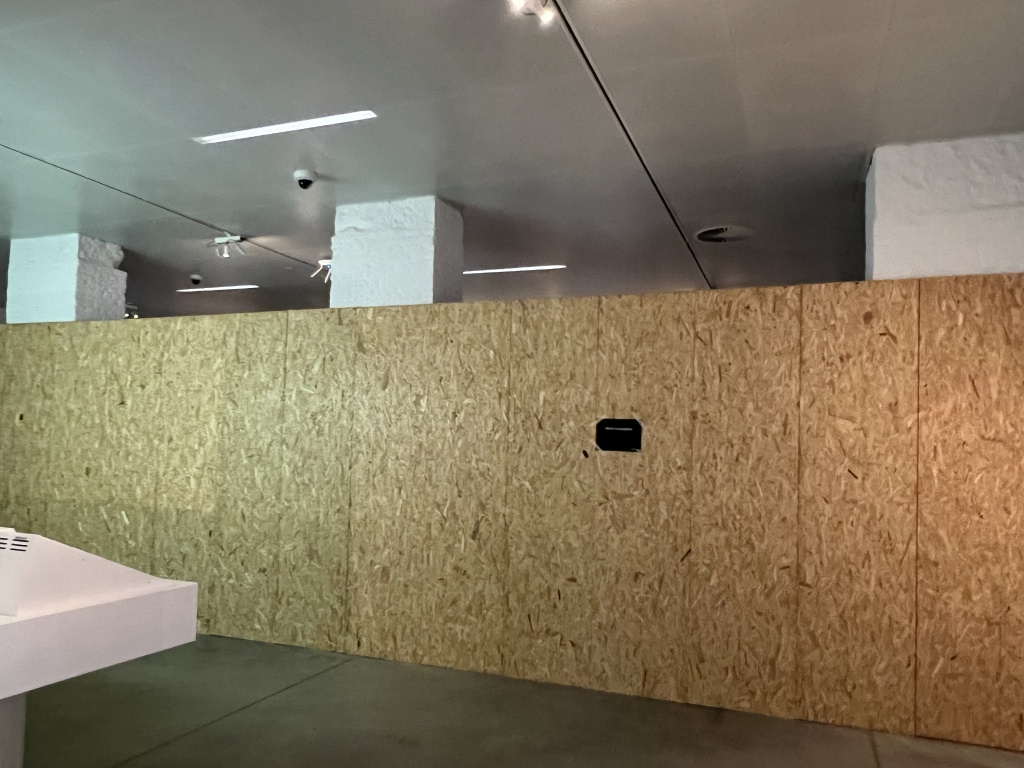The ‘cancel Russia’ approach was formulated by the Polish Minister of Culture Piotr Gliński. ‘Russian culture should disappear from the public space. We appreciate the achievements of this culture in music or literature. They are at the highest level, but we are dealing with a country that has gone crazy,’ he said.
The removal of Russian singers from performing at Eurovision, the cancellation of the St. Petersburg International Cultural Forum, and the exclusion of Russian sports teams from international competitions — are not all the consequences of the #cancelRussia movement since the beginning of the war. This longread provides more examples of cancelling Russian culture and the ongoing dialogue it sparks within the international artistic community.
1. Artworks Notable Removals
The Amsterdam Hermitage changes its name not to be tied to Hermitage in St. Petersburg
Starting from the 1st of September, the institution will do a rebranding as the H’Art Museum. Annabelle Birnie, Director of the Hermitage Amsterdam, conveyed the museum’s new vision, stating, ‘We’re going to be like a museum for museums…Three partners will bring you a lot more than one’. The cooperation with the British Museum, Centre Pompidou, and the Smithsonian American Art Museum will replace the Russian associate. The Hermitage’s official website stated, ‘War destroys everything. Even 30 years of collaboration.’
Since 2009, the Hermitage Amsterdam had been curating exhibitions that showcased items from the extensive collection of the Hermitage in St. Petersburg. However, after Russia invaded Ukraine, Hermitage Amsterdam cut connections with its St. Petersburg partner. This decision was accompanied by the closure of the Russian avant-garde exhibition.

‘War destroys everything. Even 30 years of collaboration.’
H’Art Museum
France confiscated a painting from Morozov collection
From September 2021 to March 2022, paintings from the collection of philanthropist Ivan Morozov were to be exhibited at the Fondation Louis Vuitton in Paris, but in February the French authorities extended the exhibition until April. They explained this decision by the high interest among visitors and the difficulty of returning the paintings to Russia due to sanctions.
In April 2022, it was reported that two paintings from the Morozov collection would remain in France. Pyotr Konchalovsky’s ‘Self-Portrait’ (1912) belongs to the collection of a Russian oligarch Petr Aven who is sanctioned by the EU. The masterpiece will remain in France while its owner’s assets are frozen, AFP reported. Petr Aven is a politician and a former board member of one of Russia’s biggest banks. ‘Portrait of Timofei Savvich Morozov’ (1891) by Valentin Serov is another masterpiece that will also stay in France as it is connected to an oligarch Viatcheslav Kantor, according to NYTimes. Viatcheslav Kantor has a business in mineral fertilizer production and his name is also on the EU’s sanctions list.


The Morozov collection is one of the world’s most extensive collections of Impressionist and Modern art. It comprises pieces by Gauguin, Van Gogh, Renoir, Monet, and Picasso, which were seized a century ago during the October Revolution and became state-owned property.
2. Russian Ballet Cancellation
Bristol, Wolverhampton, Northampton, Edinburgh, Bournemouth, Southend, and Peterborough theatres have cancelled performances of the Russian State Ballet of Siberia. Nadine Dorries, the Culture Secretary, expressed her approval of these cancellations on platform X (formerly Twitter).
The Russian State Ballet of Siberia is recognized as one of Russia’s preeminent ballet companies. Established in 1978, the company has embarked on several tours and has visited the UK multiple times since its debut more than 15 years ago.
The anticipated ballet production of ‘Swan Lake’ by the Moscow Royal Ballet in Dublin has been cancelled. In Croatia, Zagreb Philharmonic Orchestra has omitted two compositions by Russian composer Tchaikovsky from their repertoire. The Croatian National Theater has postponed a concert titled ‘Russian Serenade’.
3. Shut Down the Music
Denis Matsuev’s piano concerts cancelled worldwide
Russian prominent pianist Denis Matsuev has been removed from the program at Carnegie Hall in New York. The management of the International Pianistico Festival 2022 in Italy has also decided to cancel scheduled performances in Brescia and Bergamo featuring the Russian pianist. Matsuev’s concerts at Vienna’s Konzerthaus Hall have met the same fate this year. Matsuev was replaced by the French pianist Alexander Kantorow, who has actively demonstrated against warfare and has additionally conducted benefit concerts in support of Ukraine.
Denis Matsuev is known for his affiliations with Putin. Pianist signed an open letter in support of the annexation of Crimea in 2014. He was also a member of the initiative group to nominate Putin as a candidate for the 2018 presidential election and the working group for the preparation of Constitutional change in Russia that made Putin eligible for fourth presidential term.

Russian conductor Valery Gergiev lost his international titles
Valery Gergiev is another Putin supporter who in 2018 was a confidant of Putin as a presidential candidate. He starred in Putin’s election videos and sang the Russian anthem with Putin at a concert on the anniversary of Crimea’s annexation, according to TV Rain.

Gergiev was excluded from the list of participants of the Vienna Philharmonic Orchestra tour and from Carnegie Hall program. Then he lost his place in the Munich Philharmonic Orchestra. He was also stripped of the title of honorary president of the Edinburgh Festival and the leadership of several European music festivals.
Gergiev’s manager, Marcus Felsner, declared on Facebook that he would be parting ways with the conductor. Felsner described Gergiev as ‘the greatest conductor alive’ but expressed unwillingness to work with ‘a previously outspoken political supporter’ of the Russian government. The artist manager stated that he doesn’t want to benefit from ‘a regime that wages war’.
‘This is the saddest day of my professional life. My thoughts are with Valery Gergiev but, more so, with the millions of victims of the criminal war unfolding before our eyes.’
Marcus Felsner, Gergiev’s former manager
Refusing to play in Orchestra with Russians
Not only Putin’s supporters have been cancelled. The young Russian piano virtuoso, Alexander Malofeev, aged 20, was banned from performing in Montreal and Vancouver. Three scheduled concerts with the Orchestre Symphonique de Montréal (OSM) were originally slated for March 2022.
Malofeev’s withdrawal from the concert series is a result of several OSM musicians not wanting to play next to him. Katherine Palyga, a violinist at the Montreal orchestra, disclosed that she had privately requested not to perform alongside the Russian pianist due to her partner’s Ukrainian family connections, reported CBC. Palyga emphasized that given the financial compensation that the OSM was providing to Malofeev, the funds would ultimately find their way back to Russia, regardless of the situation.
‘The truth is that every Russian will feel guilty for decades because of the terrible and bloody decision that none of us could influence and predict,’ commented the pianist.
After Alexander Malofeev openly expressed his opposition to the war in Ukraine, his cancellation was over. He has already played in France, Switzerland, the USA, Italy, the UK, Germany, Latvia, and other countries’ venues, according to his Facebook page. Supporters of Russian’s regime Matsuev and Gergiev are still not welcomed in concert halls outside of Russia.
‘I still believe Russian culture and music specifically should not be tarnished by the ongoing tragedy, though it is impossible to stay aside now. Honestly, the only thing I can do now is to pray and cry.’
Alexander Malofeev, Russian pianist
4. Cancellations in Movie World
Venice Film Festival banned the Russian delegation to take part in the last two ceremonies. Those ‘who oppose the current regime in Russia’ were, however, welcomed at the ceremony, according to La Biennale di Venezia, which runs the event. The Cannes Film Festival in 2022 also announced that representatives from Russia will not be able to take part in it if they don’t protest against the assault and invasion of Ukraine. And in 2023 Ukrainian model Alina Baikova showed up in t-short of her country’s flag with an insulting message to Russian President.
The organisers of the Stockholm International Film Festival announced a boycott of Russian films created with public funds. And ‘Roskino’ (a state institution in charge of promoting Russian cinema) was banned from participation in the ‘Series Mania’ festival in France.
Many film industry giants have stopped distributing their movies in Russia. These include the Walt Disney Company, Pixar, Marvel, Lucasfilm, Warner Bros., Paramount Pictures, and Sony Pictures.
Scheduled for the end of March 2022, the festival of Russian movies in Paris ‘When the Russians…’ (‘Quand les Russes…’) was limited to the screening of one film.
The organisers refused to show all other movies in April 2022 but continued to promote Russian films in October when the hype around the #cancelRussia movement became less intense.
5. Сhurch and Oak are Victims of Politics Too
Burglary left Russian Orthodox Church in Oxford Ransacked
Oxford’s Russian Orthodox church experienced extensive disruption in March 2022 as valuable items were stolen. The incident occurred at St. Nicholas the Wonderworker in Oxford during the early hours. Archpriest Stephen Platt stated that the break-in caused significant damage to the premises. Collection boxes designated for aiding Ukrainian refugees, as well as the church’s secure storage, were forcibly opened, leading to the theft of cherished relics and crosses.
Turgenev Oak Excluded from the European Tree of the Year Competition
A Turgenev oak tree from the estate of writer Ivan Turgenev’s mother in Spasskoye Lutovinov, Orel Region, has been excluded from the European Tree of the Year competition because of the war in Ukraine. ‘The exclusion of Russia from the competition is a step that must be understood in the context of international efforts to isolate Russia in order to stop the war,’ the organisers commented on their decision. The oak was planted two centuries ago by Ivan Turgenev, one of the most important novelists in Russian culture.
The winner became a 400-year-old oak tree located in Poland’s Bialowieza forest. According to the judges, it had evolved into a representation of the Polish fight against aggression as Poland offered refuge to Ukrainians.
Russian Propaganda Using #CancelRussianCultural Movement
Polish and Russian playwright Ivan Vyrypaev renounced his Russian citizenship due to the outbreak of war and told ‘Drag them’ that in Poland each theatre director decides for himself whether or not to ‘cancel’ Russian culture. ‘Yes, there are cases when opera and ballet theatres cancel Tchaikovsky’s ‘The Nutcracker’ and Mussorgsky’s ‘Boris Godunov’. In my opinion, this is ridiculous. I understand the reasons for it, but the cancellation does not work in favour of any ideas.’
//www.instagram.com/embed.js
‘The cancellation does not work in favour of any ideas. It only helps Putin’s propaganda, because then the Russian media can write about how crazy the West has gone by cancelling culture.’
Ivan Vyrypaev, Polish and Russian playwright
Kremlin propaganda indeed condemns the West, which seems to cancel the entire Russian culture. Russian artists who denounced the government’s policies are now performing worldwide, novels by Dostoevsky and Tolstoy are sold in bookshops, and Tchaikovsky’s music continues to be played on the world’s major stages. This, however, has not prevented posters from being placed all around Russia with the following text:
‘The West has refused to lecture about Dostoevsky. We continue to admire Mark Twain’s characters.’
‘When the world’s Tchaikovsky concerts are cancelled, our love of Chopin’s music continues.’
‘Chekhov‘s plays are no longer staged in Europe. We will not love Shakespeare any less.’
Do Russians feel that they are cancelled? The Russian Centre for Public Opinion Research published a study with the following results:

Ivan Vyrypaev shared in the interview that his production of Chekhov’s ‘Uncle Vanya’ is still going on now, and was going on in the early days of the war. There are 800 seats in the hall, all tickets are usually sold out, and there are no cutbacks in the theatre. ‘The performances show the imperialism of Russian culture and they give us a chance to look at it from the point of view of Chekhov,’ says the playwright.
Should Russian Culture be Cancelled?
When asked ‘Should artists protest by staying in Russia,’ Ivan Vyrypaev answers that he understands that in Russia people get sentences of up to 9 years for disagreeing with the actions of the authorities, referring to the case of opposition politician Ilya Yashin, who was sentenced to 8.5 years in a penal colony for ‘anti-war fakes’. On the other hand, Ivan Vyrypae urges not to cooperate with Putin’s regime. ‘It’s a pity that many well-known cultural figures don’t send out a signal that they at least don’t support it.’
In April 2023, Italian president Sergio Mattarella also spoke out on the ‘cancellation’ of Russian culture. It is an integral part of European culture, so attempts to abolish it are erroneous, he said in an interview with Corriere della Sera. ‘The cultural context is the product of a continuous transformation, contradictory, dialectical, with a non-linear direction,’ the President of Italy said.

Russian writer and Ph.D. in Literary History, Andrei Astvatsaturov, claims in the interview with ‘Drag them’ that all writers from Hemingway and Dreiser to David Foster Wallace admitted that they were connected to Dostoevsky.
‘Cancelling will be traumatic for the cultures that promote it.’
Andrei Astvatsaturov, Russian writer and Ph.D. in Literary History

According to Astvatsaturov, there are many people in America and Europe who love Russian art, were ‘brought up on the great Russian classics’, and are interested in contemporary culture despite their political views. The idea of cancelling is ‘wild’ because any culture is built in dialogue with another culture, claims the writer. ‘Cancelling will be traumatic for the cultures that promote it,’ he concludes.




Leave a comment